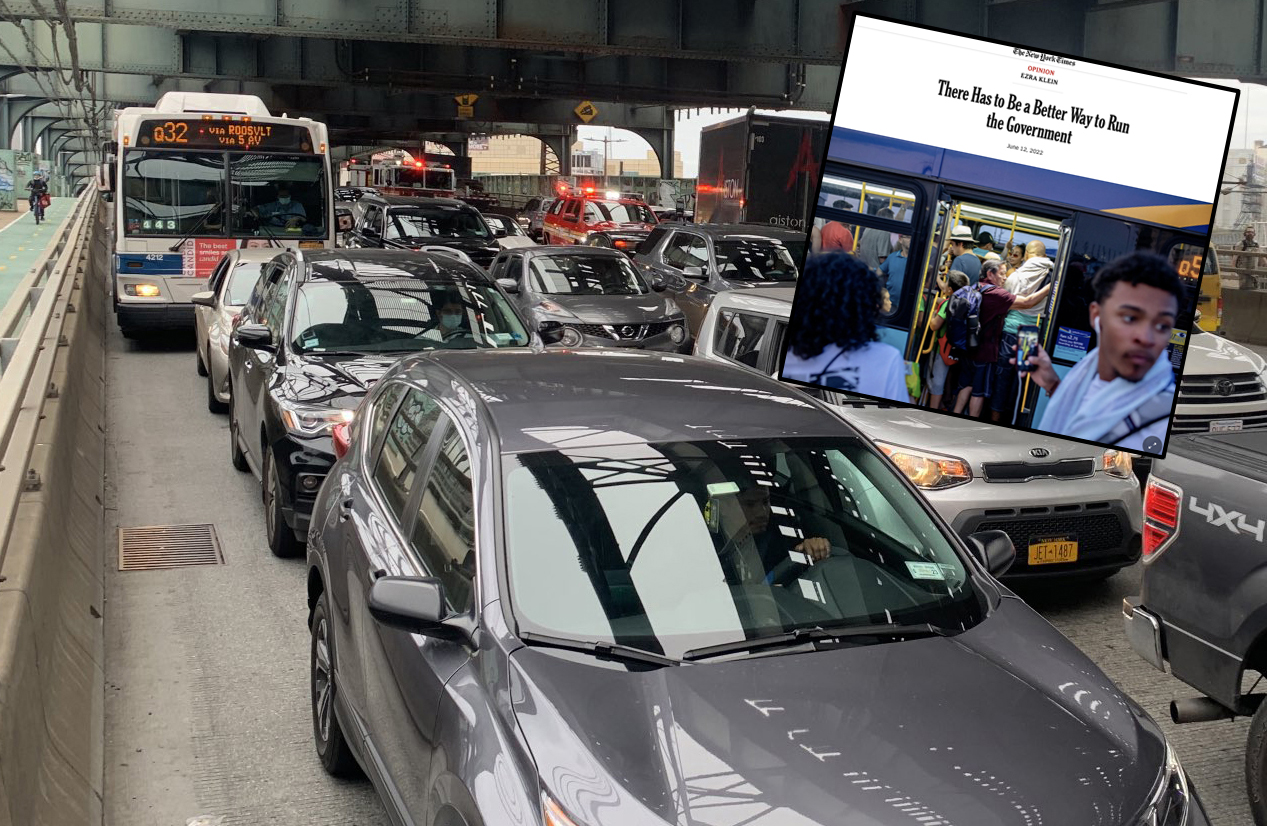New York Times big-think columnist Ezra Klein yesterday made a show of tackling New York’s drawn-out congestion pricing environmental review process. He came up clutching mostly air — giving a free pass to the Lords of Delay in Washington and Albany when he should have torched them for denying New Yorkers the $10 million or more a day in saved travel time and other benefits from this traffic-busting, transit-enhancing program that cleared the state legislature more than three years ago.
The big miss in Klein’s well-intentioned but fumbling essay? Letting MTA CEO Janno Lieber propagate the fiction that federal law bars consideration of benefits in environmental assessments.
The law as it’s been developed does not recognize or weigh who benefits environmentally across the board — it only identifies who is disadvantaged environmentally,” Lieber said. “It has no mechanism for weighing the positives as part of an environmental review. That’s what is missing — a metric for capturing positive environmental benefits.
How plaintive. How vexing. And how untrue.
A half-century of environmental review, dating to the seminal 1970 National Environmental Policy Act, has always authorized consideration of benefits along with costs of environmental projects or approvals. Indeed, “benefit-cost analysis” is part of NEPA’s DNA.
Why does this matter? Because just like any other big endeavor, congestion pricing for New York will impose costs. Drivers will pay tolls: more than a billion dollars of them each year. Trips that get priced off the roads will cost drivers another $100 million in the lost value those trips bestowed. Automotive businesses, from car dealers to car washes, may lose business, as citywide vehicle-miles traveled drop 3 or 4 percent.
But there will be a profusion of benefits in return, as total travel to Manhattan’s Central Business District increases by several percent. How? Better transit, slightly more carpooling, and a disproportionate drop in through-trips by car that confer little economic value. Meanwhile, every means of getting around, whether car, truck, subway, bus, bike, walk or commuter bus or rail, is made faster, more dependable and more pleasant, not to mention less dangerous to life, limb and lung.
If congestion pricing’s vast benefits somehow weren’t permitted in the environmental review, then it might make sense to get all of its costs to disappear. But Lieber and Klein are wrong on that score. Benefits will indeed count, and will almost certainly carry the day, in any court of law that might be called on to review the program.
The irony — and it’s pungent — is that for months Klein has been using his Times platform to inveigh against a liberalism that can no longer build because it is so ensnared in the trees of “stakeholder protection” and “public participation” that it has lost the forest of value that government-led or supported investment can create.
In March, Klein landed a roundhouse blow to NEPA insanity and anti-housing NIMBY’s with Government Is Flailing, In Part Because Liberals Hobbled It. He followed that on Memorial Day weekend with What America Needs Is a Liberalism That Builds. Both posts were inspired and essential.
Not so this time. Congestion pricing, conceived by a Nobel economist, advanced by a panoply of transit and environmental advocates, endorsed by environmental justice acolytes, mandated by the legislature, and coveted by the MTA for its promised $15 billion in capital funding, not to mention instant relief for bus riders because less traffic, should have been Klein’s poster child for paralysis by obeisance. And though his essay is eloquent, at times powerful, the punches don’t land.
In a nutshell, Klein’s fumble on benefits-counting (“The law has no mechanism for weighing the positives”) lets the hair-splitters at the MTA and, especially, at Pete Buttigieg’s U.S. DOT (which oversees the congestion pricing “lead agency,” the Federal Highway Administration) wriggle off the hook — in much the way that the fictional Sweeney Todd allowed his tormenter, the conniving, perverted Judge Turpin, to escape the barber’s death chair, unscathed.
Michael Gerrard, director of Columbia’s Sabin Center for Climate Change Law and a dean of American environmental jurisprudence, told me on Sunday that while “there’s no set formula” for weighing benefits against costs, “benefits are indeed considered in the [NEPA] decision-making process.”
In other words, Lieber’s lament that the environmental review precludes creating “a metric for capturing positive environmental benefits” is pure hokum, not to mention absurd on its face. The legislature knew full well that congestion pricing might harm the hair on a head or two. But it authorized the program because the benefits were so enormous that no conceivable cost could put them near negative territory.
And even if some unforeseen cost from congestion pricing were to surface, it could easily be remediated by tweaking the tolls, as Klein helpfully noted, or by implementing some inexpensive mitigation such as replacing apartment furnaces with cleaner electric heat in affected areas.
Sad to say, Klein’s essay won’t do bupkis to disarm the bureaucracy that is mixing quicksand right under Secretary Pete’s upturned nose. Klein, a denizen of America’s Mt. Olympus — the San Francisco Bay Area — appeared to be writing for a national audience of policy mavens. But on the ground here in New York, we’re losing not just congestion pricing’s half-a-million hours of saved travel time daily, but the very ground on which we walk, bike and live.
New Yorkers don’t need lofty essays that make congestion pricing an object lesson in environmental process gone wrong. We need razor-smart journalism that can help extricate us from the nightmare the cynics forecasted in 2019, when the legislature voted in the program: a miasma of endless delay.






